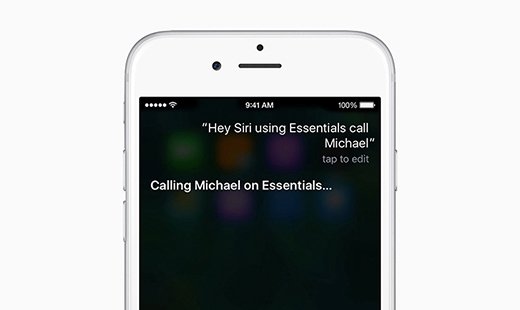Siri
What is Siri?
Siri is Apple's virtual assistant for iOS, macOS, tvOS and watchOS devices that uses voice recognition and is powered by artificial intelligence (AI).
Siri responds to users' spoken questions by speaking back to them through the device's speaker and presenting relevant information on the home screen from certain apps, such as Web Search or Calendar. The service also lets users dictate emails and text messages, reads received emails and messages and performs a variety of other tasks.
History and development
Siri derived from a combination of multiple sources, projects and technologies. The Defense Advanced Research Projects Agency (DARPA) funded the Cognitive Assistant that Learns and Organizes (CALO) project, aiming to develop a personal assistant with machine learning technologies. SRI International, a nonprofit research institute based in Menlo Park, Calif., took the technologies and framework that the CALO project developed to begin the spin-off project that would eventually lead to Siri's creation.
Nuance Communications, a software company based in Burlington, Mass. that began as a spin-off of SRI International, provided the speech recognition technology that made Siri possible. Members of the SRI International team decided to form a new startup company called Siri, Inc. in 2007. SRI researchers Dag Kittlaus and Adam Cheyer served as CEO and vice president of engineering, respectively, while Tom Gruber served as CTO.
In 2010, Apple acquired Siri, Inc., which then led to the current incarnation of Siri as a native feature on some iOS devices. The service debuted on the iPhone 4S in 2011; in June 2012, Apple announced it would add Siri to the third-generation iPad with the release of iOS 6 and integrate Siri with third-party apps. Siri is not available on earlier versions of the iPhone or iPad.
In June 2016, Apple debuted Siri on macOS Sierra, providing another point of access for Siri. In June 2017, Apple announced its HomePod device, which is controlled by Siri.
In June 2024, Apple announced a significant overhaul of Siri at the WWDC 2024 conference: Apple Intelligence, a new personal AI system that enhances Siri's capabilities.

Voice of Siri
ScanSoft, a software company that merged with Nuance Communications in 2005, hired voiceover artist Susan Bennett that same year when the scheduled artist was absent. Bennett recorded four hours of her voice each day for a month in a home recording studio, and the sentences and phrases were linked together to create Siri's voice. Until a friend emailed her in 2011, Bennett wasn't aware that she had become the voice of Siri. Although Apple never acknowledged that Bennett was the original Siri voice, audio experts at CNN confirmed it.
Karen Jacobsen, a voiceover artist known for her work on GPS systems, provided the original Australian female voice. Jon Biggs, a former tech journalist, provided Siri's British male voice.
Apple developed a new female voice for iOS 11 with deep learning technology by recording hours of speech from hundreds of candidates.
Important features and popular commands
Siri can perform a variety of tasks, such as:
- Navigate directions, including "What's the traffic like on my way to work?"
- Schedule events and reminders, such as "Text Ben 'happy birthday' at midnight on Tuesday"
- Search the web, including "Find images of dogs"
- Relay information such as "How long does it take water to boil?"
- Change settings such as "Increase the screen brightness" or "Take a photo"
Users can make requests to Siri in natural language.
Apple introduced the "Hey Siri" feature in September 2014, which allows users to activate the personal assistant by saying the command without needing to press a button on the device. The following year, Apple updated the feature to individualize the voice recognition component, which prevented users that do not own the device from accessing Siri.
Siri in iOS 11 can perform tasks such as translate languages and handle follow-up questions. Apple also opened up third-party access to expand Siri's functions to task management.
With the introduction of Apple Intelligence in 2024 comes a series of updates that provide a new look and new functionality to Siri users. Among the Siri updates are the following:
- Visual makeover. With iOS 18 and Apple Intelligence Siri gets a new icon, as a well as glowing light that wraps around the edge of the screen when active.
- Conversational context. Siri can maintain context from one request to the next, allowing for more natural interactions.
- Typing to Siri. Users will have the ability to type their queries to Siri and switch between text and voice as needed.
- In-app actions. Siri can perform more complex tasks within apps, such as editing photos or managing contacts based on on-screen information.
- On-screen awareness. Siri can take actions in or across apps, such as extracting text from photos and filling it into web forms.
- Text summaries and email writing suggestions. Siri provides text summaries and email writing suggestions powered by Apple Intelligence.
How it works
Siri's functions live primarily in the cloud, including the main automatic speech recognition and natural language interpretation. A small speech recognizer, however, runs constantly on the local device, listening for the words "Hey Siri." When the speech recognizer detects the phrase, it uses a deep neural network to convert the acoustic pattern of the user's voice into a probability distribution. Then, the "Hey Siri" detector integrates the continuous stream of information from that pattern into separate events to calculate a confidence score that the phrase was indeed "Hey Siri." Siri activates if the score is high enough.
When the user speaks a command or request, Siri collects the audio, converts it into a data file and sends it to Apple's servers. The device must be connected to the internet for Siri to function. Once the voice data is in the servers, it goes through a variety of flowcharts formed by a large database of questions and answers.
If the flowchart fails to answer the question, Siri rejects the query and responds with the standard phrase: "Would you like to search the web for that?" If the query follows the flowchart successfully, Siri communicates with other apps to perform the function. For example, if the user asks "What are some Thai restaurants near me?" then Siri uses Yelp's database of nearby restaurants to deliver that information to the user.
With the addition of Apple Intelligence, Siri will also be able to call out to ChatGPT to get information and answers for users.
Criticism
Users with strong accents may not be compatible with Siri's voice recognition software. Also, some experts claim that the service often doesn't understand user questions, cannot answer them or delivers useless answers. Those issues are what the Siri update with Apple Intelligence might help to solve.
Siri has also faced competition from Amazon, Microsoft and Google with Alexa, Cortana and Assistant, respectively. In the past, experts complained that Siri lacks innovation in comparison to other personal assistants. The addition of Apple Intelligence might change that perception over time.






